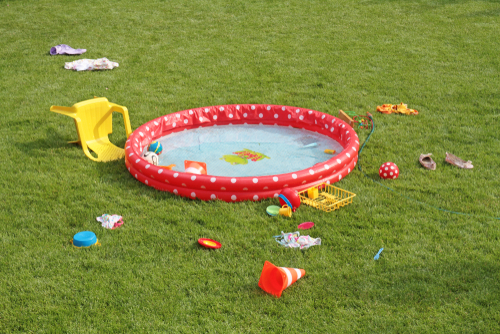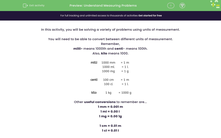In this activity, you will be solving a variety of problems using units of measurement.
You will need to be able to convert between different units of measurement.
Remember that milli- means 1000th and centi- means 100th.
Also, kilo means 1000.
| milli | 1000 mm | = 1 m |
| 1000 ml | = 1 l | |
| 1000 mg | = 1 g | |
| centi | 100 cm | = 1 m |
| 100 cl | = 1 l | |
| kilo | 1 kg | = 1000 g |
Other useful conversions to remember are:
1 mm = 0.001 m
1 ml = 0.00 l
1 mg = 0.00 1g
1 cm = 0.01 m
1 cl = 0.01 l
1 g = 0.001 kg
Reminder:
When solving a problem that uses more than one unit of measurement, always convert them so you are just working in one unit.
It's usually easier to work in the smaller unit and then convert back at the end if the question asks for the answer in the larger unit of measurement.
.jpg)
Example
Zach pours 5 litres of water into his paddling pool. He then removes 600 ml. Finally, he adds another 50 cl.
How much water is now in the paddling pool?
Give your answer in litres.

Answer
Zack is having a lot of fun, isn't he?
To work this out, we need to convert the quantities into the same unit.
Let's work in millilitres:
1 litre = 1000 ml, so 5 litres is 5000 ml
5000 ml - 600 ml + 500 ml = 4900 ml
Now we need to convert back to litres by dividing by 1000.
4.9 litres is in the paddling pool.
Your turn!
.jpg)







